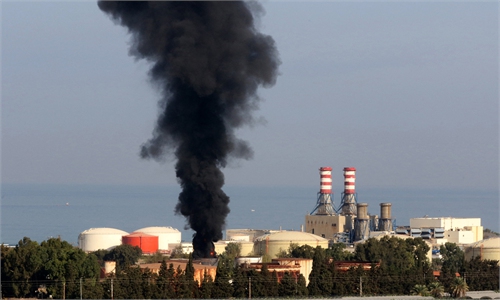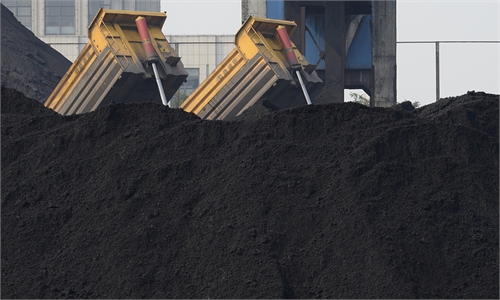COMMENTS / EXPERT ASSESSMENT
Western backbiting over China’s coal production completely unjustified

Western backbiting over China's coal production completely unjustified. Illustration: Tang Tengfei/GT
After China's coal supply and price stabilization policies bore immediate effects, Western media commentators that had previously vilified China with energy supply shortages began to use climate change as a weapon to blame the world's second largest economy for increasing coal production.
In a video clip published on Wednesday, German public broadcaster Deutsche Welle attacked China for boosting coal production as world leaders discuss climate crisis. The New York Times earlier claimed that China's moves to expand coal production to solve electricity crunch are putting the climate goal "at risk."
Just a couple of weeks ago, when the world's major economies were facing serious energy shortages, The New York Times commented that China's electricity shortage is rippling across factories and industries, testing the nation's status as the world's manufacturing hub.
From hyping China's coal supply shortage amid rising fuel prices, to using climate change to criticize China's increase in coal production to ratchet up power generation, the Western media's rabid accusations of China sounds strange and unreasonable.
It must be pointed out that it was a challenging task for China, or any other country, to solve the shortage of energy supply and stabilize the coal price in a relatively short period of time. With the onset of winter, China will have to meet domestic demands for indoor heating.
More importantly, the global manufacturing center shoulders greater responsibility for external demand. Even with the impact of the COVID-19 pandemic and the financial risks caused by excess monetary liquidity, Chinese factories still deliver daily necessities to countless families around the world with high efficiency and affordable prices.
When Western countries blame China for climate change issues, they should probably keep in mind that Chinese factories are leveraging high standards of energy efficiency to produce products that families in their countries use every day. The nation has weathered the test and consolidate its status as the world's capital for reliable manufacturing.
However, this does not mean that China will slow down the process of low-carbon development and ease its commitment to tackle climate change. China's senior envoy to the United Nations Zhang Jun on Wednesday reiterated that China always uses concrete actions to support global efforts to deal with climate change. China remains committed to achieving its goals of peaking greenhouse gas emissions before 2030, and hitting net zero emissions by 2060.
The hype surrounding China's coal-fired power industry is unfounded or formed out of ulterior motives. China's coal production and power supply sector not only have the potential to guarantee supply, but also have the highest energy efficiency in the world.
In an article titled "China won't move back to coal and abandon climate goals," the Economic Daily said a recent energy crisis is a reminder China should pursue efforts to shift to lower-carbon energy sources in a balanced and orderly manner.
Has China fulfilled its responsibilities as a major power in pursuing green development? The following data can give the best answer. Official data reveals that among the country's total installed power generation capacity of 2.28 billion kilowatts as of the end of August, installed wind power capacity accounted for 300 million kilowatts, a year-on-year increase of 33.8 percent; installed solar power capacity was 280 million kilowatts, a year-on-year increase of 24.6 percent, reflecting China's significant progress in promoting clean energy.
China is advancing the transition to new energy at an unprecedented speed, and it has one of the highest levels of energy efficiency in the world. It's time for the Western media and politicians to open their eyes and look at the facts, and stop their vicious attacks against China.
The author is chief analyst at energy industry website china5e.com. bizopinion@globaltimes.com.cn



